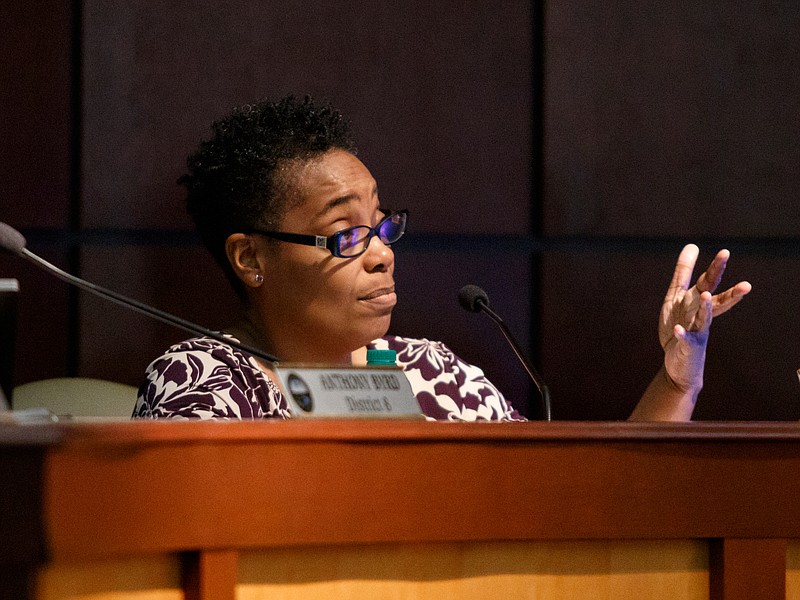Chattanooga City Councilwoman Demetrus Coonrod is as tired of black people dying from police use of excessive force as the next person.
Referring to the most recent example of George Floyd in Minneapolis during a virtual City Council meeting earlier this week, she said "those behaviors are just not acceptable in 2020."
In other words, they shouldn't be glossed over or minimized by being called aberrations, one-time incidents or someone just making a mistake.
But Coonrod dared to go further - to broach the problem of black-on-black crime.
"[W]e are losing too many black men and women due to violence from our own people, from black people," she said. ... "Sometimes that's a harsh reality and we don't want to talk about it in the black community, but we've got to start talking about it because we've got too many families hurting, we've got too many people that's left without their dad."
The issue was personal to Coonrod. A recent homicide in Chattanooga left her granddaughter without a father.
"[N]ot just because of [her granddaughter] Peyton," she said, "but it's so many other parents that's waiting on justice to be served because their child was gunned down by the hands of somebody that looks like us - it's just not acceptable.
"And we need more people speaking up about it - we can no longer sweep it up under the rug ... . We've got to talk about it. Because we can't continue to lose people on our watch. The community is looking for us to lead, and that's what we need to do."
A few statistics - numbers few protesting on the streets across the U.S. want to talk about - help put the problem in perspective.
In recent years, police have killed about 1,000 Americans a year, about a quarter of those black. Of those 1,000, less than 4% involve a white officer and an unarmed black man. Last year, according to The Washington Post, police killed nine unarmed blacks and 19 unarmed whites across the country.
That's 4% and nine blacks too many, but 50 law enforcement officers are annually shot and killed across the country in the line of duty. And Heather Mac Donald of the Manhattan Institute has calculated that a police officer is 18.5 times more likely to be killed by a black man than an unarmed black man is to be killed by a police officer.
However, to Coonrod's point, the No. 1 cause of death for young black men is homicide, almost always by a another black male. In 2018, about 7,400 blacks were homicide victims, which was more than half the U.S. total, though blacks represent only 13% of the population.
In Chicago, for instance, as of May 25, black men - most of them in their 20s or younger - had accounted for 303 of the 520 homicide deaths the city had seen in the last 365 days.
The numbers are much smaller in Chattanooga, but they're no less important, especially when your granddaughter's father is a victim.
"This behavior is getting out of hand," Coonrod said. "I am tired of it. Every day we get an email from the police department where somebody black has shot somebody black or killed somebody black. It's not acceptable. Enough is enough.
"If I'm going to stand up and protest against white police officers that are killing black people or displaying any acts of police brutality, I'm going to take that stand against black people killing black people the same.
"... "We've got a problem within our own culture, and it needs to stop," Coonrod said. "I need men standing up having a conversation with your young boys, your women, girls, all of that. We need to take a stand together."
The first-term councilwoman said she knew she would take some backlash over her words, but she didn't care.
"[T]oday ain't your day - it ain't about you," she said. "All that hoo-hah, I don't want to hear that. Because if you think that in 2020 that it's acceptable for black people to kill each other, I need you to pull up. I need you to pull up so that we can have a conversation."
Coonrod also seemed to touch on how protests can easily morph into hate and worse.
"We are ... supposed to be much better than what I am seeing things being displayed in our city over the past week with different protests and everything," she said. "We are actually leaning toward more division, and we just can't take that right now. We don't need any more division. We need to be together and united.
"... So my call to action for everybody is that we need to hold every act of violence accountable. I don't care if you're black or white. Every act. This is serious, people, it's not a game."
Coonrod is right, and her blacks colleagues on the commission expressed similar sentiments. If the George Floyd death is a moment for the country, it must not only be a moment to consider black deaths at the hands of police but black deaths at the hand of other blacks. If it's not both, then the moment will have been lost.
